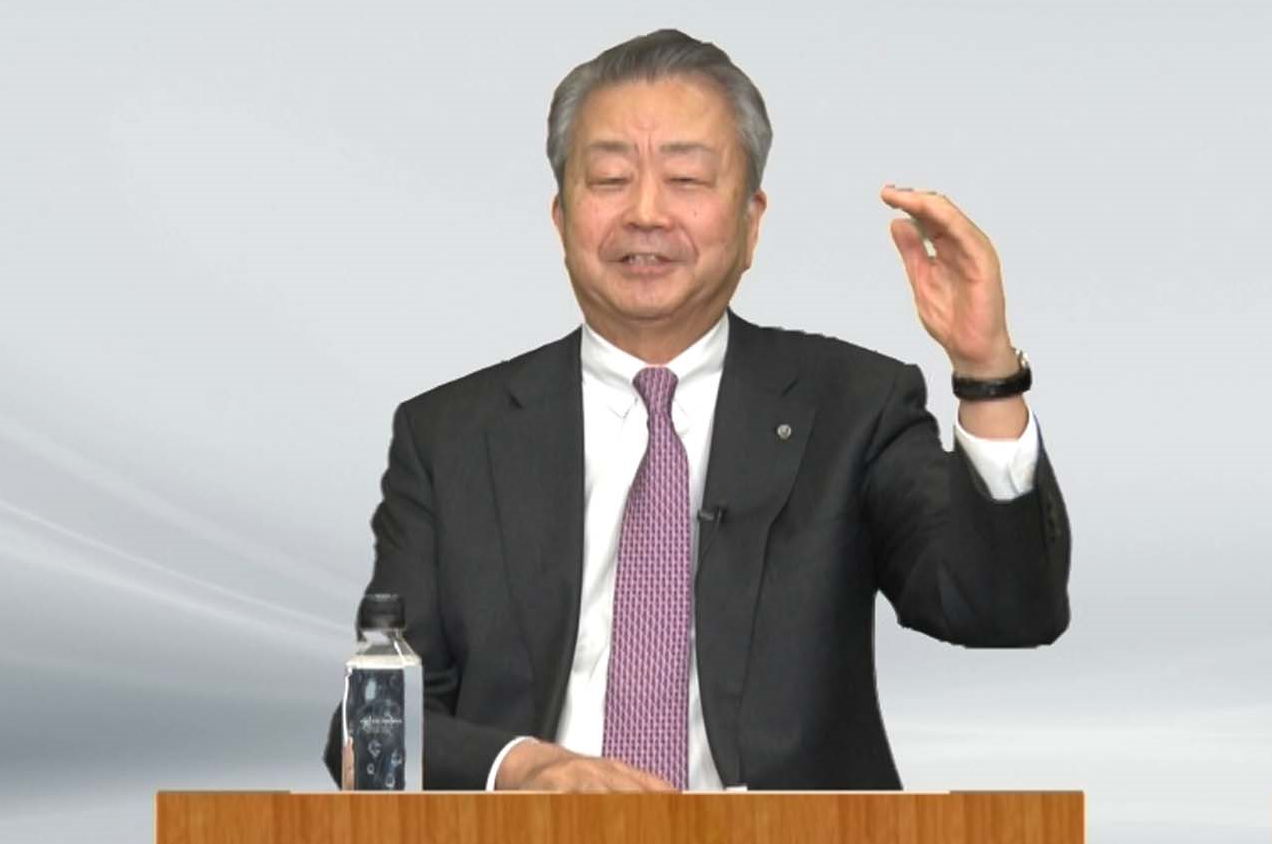Microsoft ends support for Internet Explorer on June 16, 2022.
We recommend using one of the browsers listed below.
- Microsoft Edge(Latest version)
- Mozilla Firefox(Latest version)
- Google Chrome(Latest version)
- Apple Safari(Latest version)
Please contact your browser provider for download and installation instructions.
When you select a year, you can see the list of articles for the selected year.
November 10, 2021
CEO Press Conference
Financial Results for 2nd Quarter of the 2021 Fiscal Year
Jun Sawada, President and Chief Executive Officer, Representative Member of the Board
Also in attendance were:
Kazuhiko Nakayama, Senior Vice President, Head of Finance and Accounting Dept.
Takashi Taniyama, Senior Vice President, Head of Corporate Strategy Planning Dept.

(Jun Sawada)
Before I talk about our financial results, I would like to mention that NTT DOCOMO has submitted a report to the Ministry of Internal Affairs and Communications today about the fault that occurred in its telecommunication services on October 14. I would like to apologize sincerely again for the disruptions that this fault caused to many of our customers and the major impact that was caused to communities as a whole. NTT DOCOMO is taking thorough measures to ensure that this fault does not occur again, and inspections and checks will be carried out at other NTT Group companies to ensure that an issue of this nature does not occur. We appreciate your patience.
I'll now report on our consolidated financial results and give an explanation. Our operating revenue and operating income for the second quarter of the 2021 fiscal year both increased year-on-year and our profit for the period was our highest yet. Our operating revenue increased by 176.3 billion yen year-on-year to 5 trillion 887.6 billion yen due to factors such as an increase in NTT DATA's operating revenue. In terms of operating income, NTT DOCOMO's operating income decreased due to factors such as the revision of its accounting system in the previous fiscal year, but this was canceled out by positive factors such as increased operating income and cost reduction at companies such as NTT DATA, seeing our overall operating income increase by 700 million yen year-on-year to 1 trillion 9.3 billion yen. Profit for the period increased by 134.3 billion yen year-on-year to 675.8 billion yen due to factors such as the acquisition of minority stockholders' shares in NTT DOCOMO in order to make it a wholly owned subsidiary. At present, both operating revenue and operating income are better than expected.
Overseas sales increased year-on-year due to factors such as an increase in SI revenue as a result of a high level of demand for digitalization at NTT DATA. Overseas operating income margin is also improving due both to NTT DATA's increase in revenue and the effects of our structural reform.
Here is a line chart showing year-on-year increases and decreases in operating revenue and operating income for each quarter over the past few years. The right half shows an increase in operating revenue and the top half shows an increase in operating income in comparison with the previous fiscal year, so the first quadrant, the top right one, can be considered the ideal position. First, I'll draw your attention to the blue dotted line for the 2018 fiscal year in the first quadrant, where you can see that both operating revenue and operating income continued to increase. Then, for the 2019 fiscal year, you can see the green dotted line moves downward and to the right, which shows that while operating revenue increased, operating income trended downward due to factors such as NTT DOCOMO's adoption of its new rate plan. And then for the 2020 fiscal year, you can see this yellow dotted line on the left where both operating revenue and operating income decreased due to the novel coronavirus (COVID-19), but then both recovered due to factors such as revenue increases and cost reduction in each company. In the 2021 fiscal year, we're back to the red dotted line. Operating revenue increased but operating income decreased in the first quarter, and then in the second quarter, the quarter I'm reporting on here, both are trending upward, which shows that our results for this year are in line with our projections.
I'll now talk about the situation of each segment. In our mobile communications business segment, operating revenue increased but operating income decreased. The segment is recovering from the impacts of COVID-19 that affected business last year, with increased revenue from device sales leading to an overall increase in operating revenue. Operating income decreased, however, due to the revision of the accounting system in the previous fiscal year, an increase in network costs resulting from factors such as the expansion of our investments in 5G in the second half of the previous fiscal year, and an increase in research and development costs associated with factors such as 6G. The decrease in operating income in the first half has been accounted for in our plan, and our overall results have been better than expected, so the results for the second quarter can be considered good progress toward achieving an increase in both operating revenue and operating income for the year.
In our regional communications business segment, both operating revenue and operating income increased due to an increase in revenue for packet communication and IP systems centering on optical services at both NTT East and NTT West, along with factors such as the change in the accounting system and cost reduction measures.
In our long distance international communication business segment, both operating revenue and operating income decreased year-on-year due to an increase in costs associated with structural reform at NTT Ltd. and a decrease in telecommunications device sales and maintenance service revenue due to factors such as COVID-19 and the semiconductor shortage.
In our data communications business segment, both operating revenue and operating income increased year-on-year, as NTT DATA mentioned in the announcement of their financial results yesterday, due to a high level of demand for digitalization.
In addition to our financial results, I have five news items to share. The first is the revision of the NTT Group Global Sustainability Charter and NTT Group Policy on Human Rights. Our Sustainability Charter is a global-standard charter that takes a broader view than the current NTT Group CSR Charter, covering the SDGs, ESG and CSV. Our core principle for moving toward a sustainable society is "Self as We". I'll explain this in more detail later, but basically, we have established three themes--coexistence with nature, mutual prosperity of cultures and maximization of wellbeing--and will carry out measures accordingly. To supplement this charter, we have revised our Human Rights Policy. This follows the establishment of the NTT Group's New Environment and Energy Vision and shift to a new management style that we explained on September 28, 2021. I'll share NTT's thoughts about a sustainable society. First, today's society cannot be divided into binaries such as global and local, the environment and the economy or old and new: in each case, there are contradictory phenomena that do not fit neatly into one category or the other. And one thing we know to be true is that things like reality and meanings are in the eyes of the beholder. So, we believe that encapsulating those contradictory concepts and phenomena and creating a paraconsistent society where a variety of values are accepted will lead us to a sustainable society. And the principle of "Self as We" is the cornerstone of the NTT Group's endeavors to achieve this. "Self as We" is the principle that we as individuals are not discrete entities. We are connected with many other entities including people, items and technology. We are thought of and supported. The NTT Group aims to approach various measures with the spirit of altruistic coexistence, where we are not only making ourselves happy but making others' happy at the same time. We have set coexistence with nature, mutual prosperity of cultures and maximization of wellbeing as key themes of our "Self as We" approach. Our reasoning for this is that nature is an altruistic entity and we are part of it. It is by connecting ourselves to other entities through the threads of ethics that we can bring stability to cultures and society and pursue our own happiness in harmony with that of other entities. Nine challenges and 30 activities have been designated in line with these themes, which we will actively implement to contribute to the building of a sustainable society. We plan to set ESG indexes for these initiatives. The indexes you see in the red box--carbon neutrality, B2B2X revenue, human rights and diversity and inclusion--are particularly critical indexes, which will be reflected in our financial indexes and executive compensation.
Next, I'll talk about our Human Rights policy. In recent years, there has been a growing awareness of various human rights issues, both domestically and overseas, and there is a growing call for companies to take responsibility for human rights. For this reason, we revised our current Human Rights Charter to establish a globally relevant human rights policy. This policy upholds international criteria and stipulates policies for human rights issues that are of particular importance, including diversity and inclusion, highly ethical technology, healthy work in daily life (health management) and appropriate expression, speech and visuals. These policies will be combined with thorough due diligence on human rights and management of our entire value chain at a global level. Through these initiatives, we will ensure human rights throughout our operations and fulfill our duty to society as a company.
My second piece of news is about our title partnership agreement with JAPAN RUGBY LEAGUE ONE. This league has been Japan's primary rugby union competition for 18 seasons under the name JAPAN RUGBY TOP LEAGUE. It will be renamed JAPAN RUGBY LEAGUE ONE from January 7, 2022. We have signed a title partner agreement with the league, making the league's full new name NTT JAPAN RUGBY LEAGUE ONE. NTT DOCOMO and NTT Communications will also be business co-creation partners, working with JAPAN RUGBY LEAGUE ONE to create new fan experiences with ICT.
My third piece of news is about new services we have been rolling out to build a Remote World. After conducting joint proof-of-concept experiments since April 2020, NTT East and the IPA launched a web version of our Thin Telework System. The free service is already being used by around 200,000 customers, and it is possible to connect from OS other than Windows. Meanwhile, our elgana business chat service now has over 1.2 million user IDs. We will continue working to link this with other services and expand its functionality. The last service I want to talk about is Maina Pocket™, an ID service that links users' My Number (social security and tax number) card with their smartphones. This service was launched in October and allows users to provide proof of identity securely in remote settings by simply entering a PIN.
My fourth piece of news is an update on the progress of our medium-term management strategies. The parts in red are new contents, but there isn't enough time to explain this, so I'll leave it at that.
Finally, I'll tell you about our treasury stock cancellation. It was decided at today's Board of Directors' meeting that we will cancel the treasury stock we are currently holding. The stock that will be canceled consists of around 279 million shares as of the end of March 2021, which accounts for 7.15% of our total issued shares.
This concludes my explanation.
Corporate


NTT Group Medium-Term Management Strategy
New Value Creation & Sustainability 2027 Powered by IOWN
We announced our new NTT Group medium-term management strategy which is based on the fundamental principle "Innovating a Sustainable Future for People and Planet" in May 2023
NTT STORY
WEB media that thinks about the future with NTT










